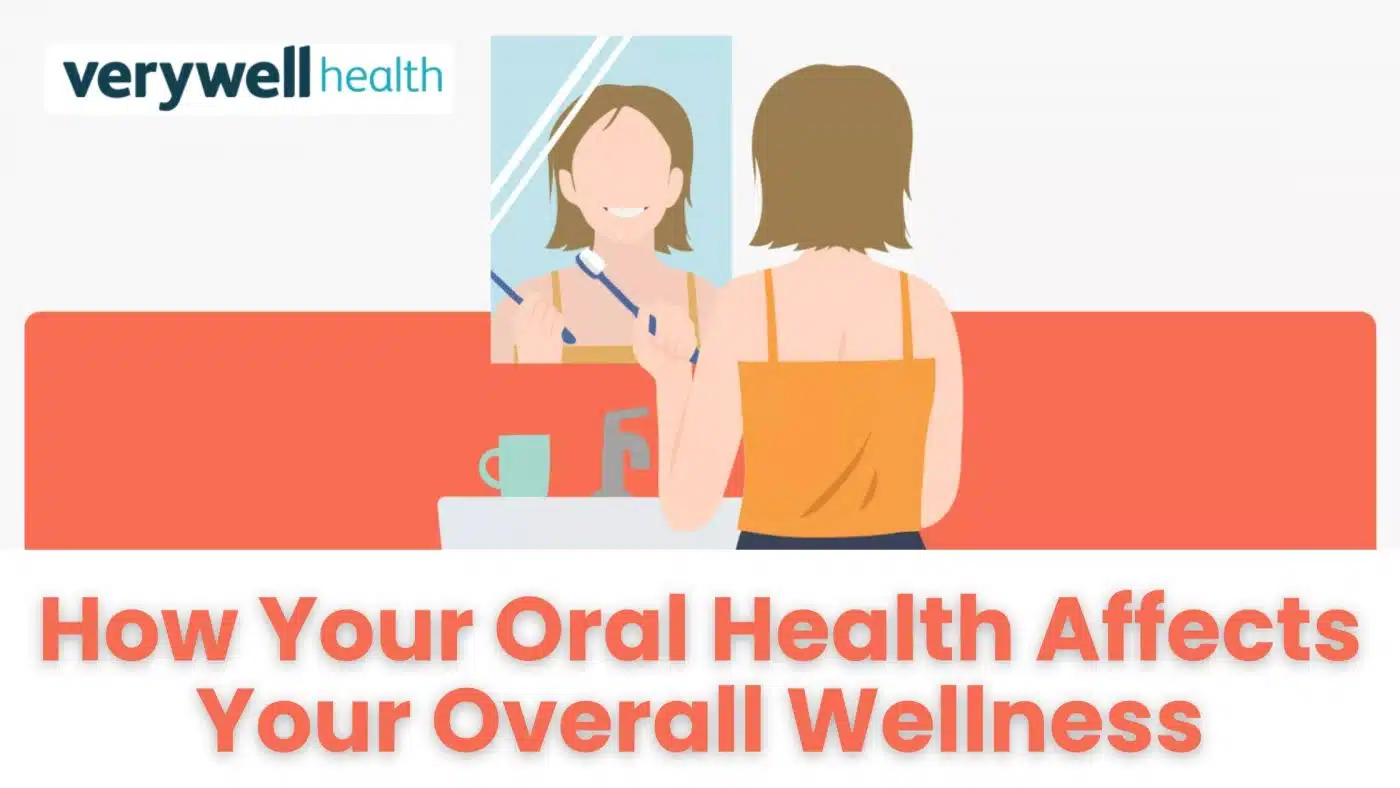All, Whole Body Health
Your Mouth Has a Lot to Say About Your Overall Health
The benefits of good dental hygiene go beyond bright smiles. Making sure you’re brushing properly, flossing daily, and keeping up with dental appointments preserves your overall health.
Dental problems such as gum disease and tooth decay can contribute to a number of health conditions, including heart disease and pneumonia.
This article provides a quick overview of the conditions associated with poor oral health, those that can make your dental health worse, as well as what you can do to maintain your smile.
What Conditions Are Linked to Poor Oral Hygiene?
Increasingly, researchers are finding significant connections between your overall health and dental health. Poor oral hygiene has been directly linked to pneumonia, a range of serious heart problems, as well as complications during pregnancy and childbirth.1
Heart Disease
Over the last several years, a growing body of evidence has linked dental issues, especially missing teeth and periodontitis (advanced gum disease), with heart disease and other cardiac issues.2
Batty G, Jung K, Mok Y et al. Oral health and later coronary heart disease: cohort study of one million people. Eur J Prev Cardiol. 2018;25(6):598-605. doi:10.1177/2047487318759112
These cardiac and blood circulation problems include:
- Coronary heart disease: Also known as atherosclerosis, coronary heart disease arises when arteries in the heart harden, interrupting or entirely blocking blood flow.
- Heart failure: This is when the heart is unable to pump sufficiently, causing blood to pool in other parts of the body, especially the legs and lungs.
- Cardiac arrhythmia: Characterized by irregular, too fast, or too slow heartbeat, cardiac arrhythmias, such as atrial fibrillation (Afib), may also arise.
- Stroke: Caused by blood clots or burst vessels in the brain, strokes cause seizures and are a medical emergency.
People with poor oral health have increased rates of heart attack and stroke, among other cardiac issues. While oral problems may not directly cause cardiac conditions, they may contribute to problems with the heart and are related. More research is needed, though, to understand why there is this connection.3
Endocarditis
Poor oral hygiene is also a risk factor for endocarditis, an infection of the tissues of the heart. Bacteria in the mouth due to the gum diseases gingivitis and periodontitis can enter the bloodstream and cause a potentially life-threatening inflammation of the endocardium (the tissues in the inner lining of the heart’s chambers and valves).4
Pregnancy and Birth Complications
Complications during pregnancy and birth can also arise due to poor oral hygiene and health. Additionally, being pregnant makes you more likely to develop gingivitis, periodontitis, loose teeth, or tooth decay due to hormone fluctuations. Problems in the mouth have been linked to a range of such issues, including:5
- Premature birth
- Low birth weight
- Preeclampsia
- Acute necrotizing ulcerative gingivitis (also known as trench mouth)
- Tumors on the gum tissue of the mother (epulis gravidarum)
Pneumonia
Pneumonia is a lung infection that ranges in severity and can become life-threatening.
A 2020 study of pneumonia patients in South Korea found missing teeth, having cavities, and poor oral hygiene to be closely linked to this condition.6 This is because bacteria in the mouth can enter the bloodstream and infect the lungs, leading to symptoms of pneumonia.
Rheumatoid Arthritis
Though the exact nature of the relationship is unknown, associations have also been found between gum disease and rheumatoid arthritis (RA). This autoimmune disease damages the joints, causing pain and inflammation. Certain bacteria in the mouth, especially Porphyromonas gingivalis, have been found in arthritic joints, indicating an association.7
Alzheimer’s Disease
Studies have linked gingivitis and Alzheimer’s disease, a progressive form of dementia that causes a degeneration of nerve cells in the brain. Researchers have found that the Porphyromonas gingivalis bacteria can travel from the gums to the brain, where they emit enzymes that damage neurons.8
Alzheimer’s and Dental Care
People with Alzheimer’s disease may need assistance taking care of their teeth. Caregivers or family members may need to help people with Alzheimer’s brush and floss regularly.
What Conditions Can Worsen Oral Health?
Not only can oral health conditions like gingivitis and tooth decay lead to or worsen other health issues, oral health is also affected by other diseases. This is especially the case with chronic and long-term conditions. Here’s a quick breakdown of health problems that can affect your mouth.
Diabetes
Diabetes arises when there are problems converting sugars (glucose) into energy, leading to very high blood sugar levels. There are several different types of diabetes, of which type 2 diabetes is the most common.
Diabetes causes excessive urination, sudden weight loss, fatigue, and other symptoms and is associated with periodontal disease. Gum disease can cause tooth loss and other problems.9
HIV/AIDS
Living with human immunodeficiency virus (HIV), which can lead to AIDS, can significantly impact oral health. With HIV, a range of oral and dental issues can arise, including:10
- Gingivitis
- Periodontitis
- Cavities
- Canker sores
- Dry mouth
- Blisters
- Oral candidiasis (a fungal infection of the mouth)
Immune Health and Dental Health
People with HIV are more vulnerable to dental and oral problems because the virus attacks and weakens the immune system. As a result, it’s tougher for the body to fight off bacteria in the mouth.
Osteoporosis
A disease that affects bone health and density, osteoporosis is another condition that can cause significant damage to your teeth and gums. The bone loss associated with this disease can affect the jawbone, causing teeth to loosen or fall out. Weakened bones in the jaw can also cause problems with dental appliances like bridges and dentures.
Osteoporosis is also associated with periodontitis. Though the exact connection isn’t clear, the weakening of the underlying bone may make the gums and teeth more susceptible to bacterial infection.11
How to Maintain Oral Health
Good oral hygiene includes the following:12
- Brush properly: An electric toothbrush is preferred. If using a manual toothbrush, use small, circular motions. No matter which toothbrush you use, brush for two to three minutes at a time, twice a day.
- Floss: Brushing alone is unable to get into the spaces in between the teeth, floss at least once a day.
- Incorporate fluoride: Fluoride in drinking water (the water you drink from the tap) or toothpaste helps strengthen tooth enamel.
- Get regular care: Make sure to visit a dentist for routine checkups and cleanings two times per year.
- Reduce alcohol and tobacco use: Smoking and using alcohol and chewing tobacco can damage your teeth and gums.
- Be aware of medications: Dry mouth is a common side effect of medications, and it can lead to dental problems.
Summary
Dental issues, especially tooth loss and gum disease, have been linked to heart disease, endocarditis, and complications during pregnancy and birth, among other conditions.1 Furthermore, diabetes, HIV/AIDS, and osteoporosis can worsen oral health. Practicing good oral hygiene and getting regular dental checkups are important for maintaining your overall health.
A Word From Verywell
There’s a close relationship between the health of your teeth and that of the rest of your body. Developing good dental hygiene habits and keeping up with dental appointments are part of broader self-care practices. If you’re concerned about your teeth or are due for a checkup, be sure to call your dentist.
Read the full article here: www.verywellhealth.com/importance-of-dental-hygiene-5235243



Comments are closed.